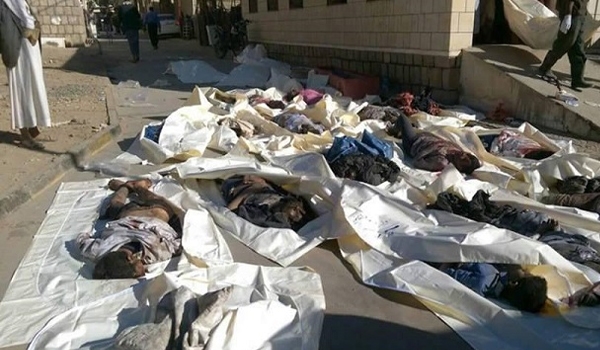
RNA - Despite the reopening of Wadea, however, UN officials say the Saudi-led coalition is still blocking all of their aid deliveries into the country, continuing the illegal siege. The near-term concern is for the lack of medicine, as northern Yemen is essentially out of everything at this point, and doctors say several hundred patients will die within the next week simply for lack of medicine.
The long-term prospects are even worse, with northern Yemen having an estimated six weeks of food left, and UN officials warning that millions could be killed by starvation if the blockade continues past that point, causing one of the worst famines in generations. The blockade has already impacted millions, with malnutrition now common across the country, particularly in the north, and upwards of a million people coming down with cholera in the worst outbreak in human history, which killed over 2,000 people alone.
Clearly, if international aid deliveries are not resumed, Yemen will experience the worst famine the world has seen in recent decades. In the words of Under-Secretary-General for Humanitarian Affairs and Emergency Relief Coordinator Mark Lowcock, “It will not be like the famine that we saw in South Sudan earlier in the year where tens of thousands of people were affected, and it will not be like the famine that cost 250,000 people their lives in Somalia in 2011 - it will be the largest famine the world has seen for many decades with millions of victims.”
Yemen has long depended on imports, importing up to 90 percent of essential goods. A previous aerial and naval blockade, instituted days after the unjustified war began in 2015, has already left 20 million people in need of humanitarian assistance. This includes seven million facing famine-like conditions who rely on food aid and almost 400,000 children suffering from severe malnutrition who require therapeutic treatment to stay alive.
Due to limited funding, humanitarian agencies are only able to target one-third of the population while the other two-thirds rely on commercial imports. If ports are not reopened, food supplies will be exhausted within weeks. The humanitarian situation in Yemen is extremely fragile and any disruption in the pipeline of critical supplies such as food, fuel, and medicines has the potential to bring millions of people closer to starvation and death. The continued closure of borders will only bring additional hardship and deprivation with deadly consequences to an entire population suffering from a conflict that is not of their own making.
In the Middle Eastern nation, Save the Children has also warned of a disaster for children if aid is impeded. The humanitarian community has warned that the current stock of vaccines in the country will last one month. If it is not restocked, there will be outbreaks of communicable diseases such as polio and measles which will particularly impact children under five and those suffering from malnutrition. The Red Cross also reports that its shipment of chlorine tablets needed to combat the cholera epidemic has been blocked, worsening an already dire humanitarian situation.
This is while Western governments have also faced criticism for their role in the conflict: arms sold to Saudi Arabia are destined for use in the Yemeni war. The Saudi Arabia-led war is a tragedy of epic proportions in which the United States is deeply and directly involved. The Saudi/UAE coalition could not execute the war without US direct involvement - specifically the refueling of their planes carrying out the bombing - and the further assistance of providing bombs and targeting intelligence. US fealty to Saudi Arabia has worsened the chaos and suffering sweeping across the Middle Eastern nation.
It is time for the United Nations to take swift action now. The world body should exert pressure on Saudi Arabia and its allies to immediately open all ports and allow unhindered humanitarian and commercial access to people in need. The Saudi-led coalition should give clear assurance that there will be no disruption of air services, including the UN Humanitarian Air Service, and to scale back interference with all vessels that have passed inspection.
Next, the UN should force the Saudi-led invaders to end the conflict. This is because humanitarian aid is not the solution to Yemen’s humanitarian catastrophe. Only a peace process will halt the horrendous suffering of millions of innocent civilians.
847/940